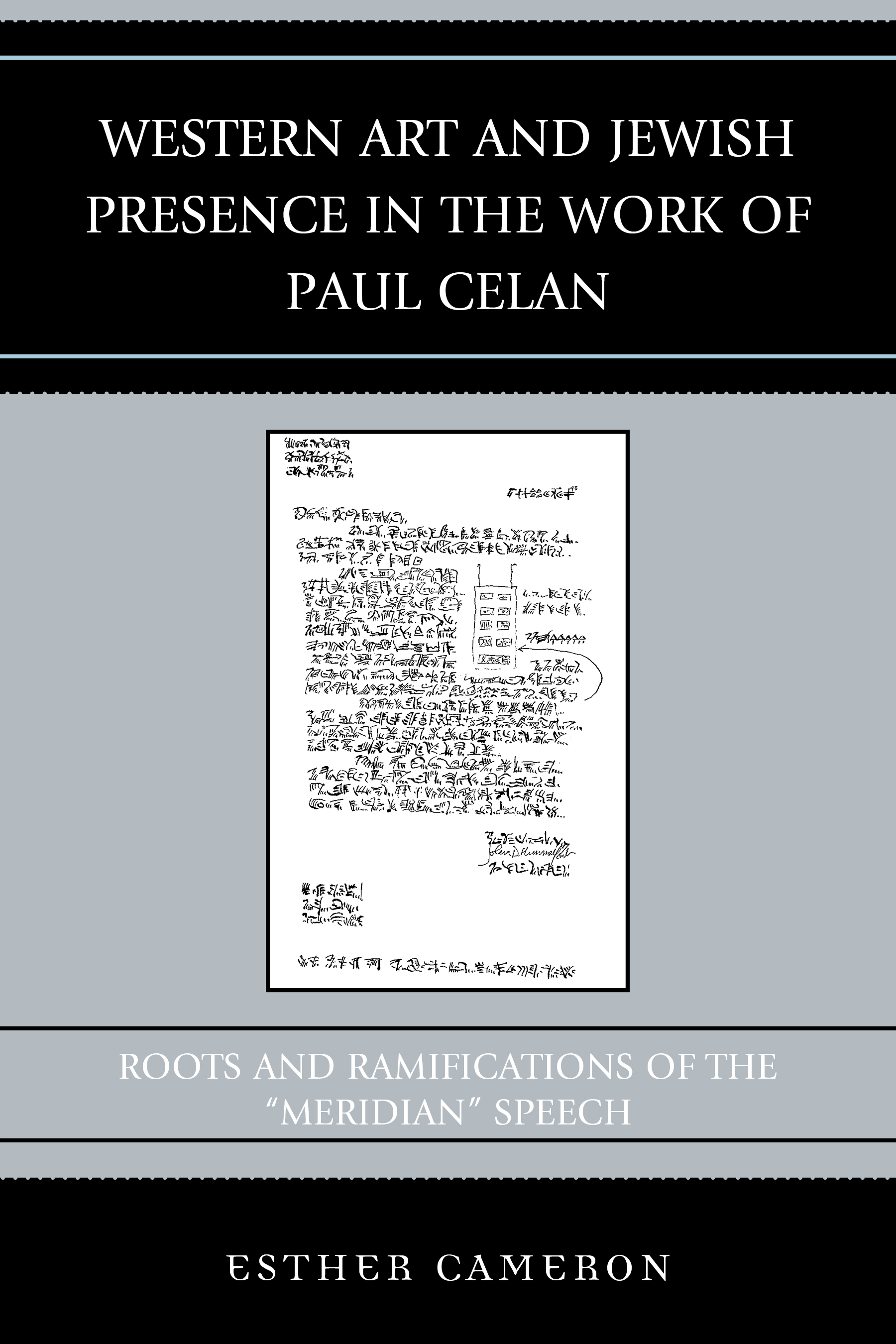Western Art and Jewish Presence in the Work of Paul Celan
Graven Images
Series Editor: Leonard V. Kaplan
The Graven Images series is intent upon publishing intellectual contemplations from the foremost scholars of law, theology, and the humanities. In part, Graven Images returns to the possibility of engaging the real and its analysis without losing the gains of the Enlightenment. Series authors and editors choose to revisit classical thought and analysis with an aim of understanding contemporary issues, creating trust and meaning in a confused and ever-changing modern world.
Titles in the Series
The Weimar Moment: Liberalism, Political Theology, and Law, edited by Leonard V. Kaplan and Rudy Koshar
Theology and the Soul of the Liberal State, edited by Leonard V. Kaplan and Charles L. Cohen
The Law Before the Law, by Steven Wilf
Cognitive Justice in a Global World, edited by Boaventura de Sousa Santos
Thinking Jewish Culture in America, edited by Ken Koltun-Fromm
Rethinking Philosophy in Light of the Bible: From Kant to Schopenhauer, by Brayton Polka
Western Art and Jewish Presence in the Work of Paul Celan: Roots and Ramifications of the Meridian Speech, by Esther Cameron
Western Art and Jewish Presence in the Work of Paul Celan
Roots and Ramifications of the
"Meridian" Speech
Esther Cameron
LEXINGTON BOOKS
Lanham Boulder New York London
Published by Lexington Books
An imprint of The Rowman & Littlefield Publishing Group, Inc.
4501 Forbes Boulevard, Suite 200, Lanham, Maryland 20706
www.rowman.com
16 Carlisle Street, London W1D 3BT, United Kingdom
Copyright 2014 by Lexington Books
All rights reserved. No part of this book may be reproduced in any form or by any electronic or mechanical means, including information storage and retrieval systems, without written permission from the publisher, except by a reviewer who may quote passages in a review.
British Library Cataloguing in Publication Information Available
Library of Congress Cataloging-in-Publication Data
Cameron, Esther.
Western art and Jewish presence in the work of Paul Celan : roots and ramifications of the Meridian speech / by Esther Cameron.
pages cm. -- (Graven images)
Includes bibliographical references and index.
ISBN 978-0-7391-8412-7 (cloth : alk. paper) -- ISBN 978-0-7391-8413-4 (electronic)
1. Celan, Paul. Meridian. 2. Celan, Paul, 1920-1970--Criticism and interpretation. I. Title.
PT2605.E4M4735 2014
831'.914--dc23
2014033337
 TM The paper used in this publication meets the minimum requirements of American National Standard for Information Sciences Permanence of Paper for Printed Library Materials, ANSI/NISO Z39.48-1992.
TM The paper used in this publication meets the minimum requirements of American National Standard for Information Sciences Permanence of Paper for Printed Library Materials, ANSI/NISO Z39.48-1992.
Printed in the United States of America
Circumference thou Bride of Awe
Possessing thou shalt be
Possessed by every hallowed Knight
That dares to covet thee
Emily Dickinson
Introduction
The Landscape of Reading
In the intellectual history of the twentieth century, Paul Celan holds a unique position. On the one hand he was perhaps the last great figure of the Western poetic tradition, one who took up the dialogue with its classics and who responded to the questions of his day from a global concern, if often cryptically. And on the other hand, Paul Celan was a witness to and interim survivor of the Holocaust and, as he once put it, perhaps... one of the last who must live out to the end the destiny of the Jewish spirit in Europe. These two identities raise questions about each other which were evidently present for Celan in the very act of poetry.
Paul Antschel, who became Paul Celan, was born in 1920 in Czernowitz, capital of the Bukowina region which had just become part of Rumania, a city in which German-speaking Jews were the dominant element, and where Jewish and Western culture seem to have been on unusually friendly terms. This came to an end with the Nazi invasion, in which two-thirds of the Jews of Czernowitz, including the poets parents, were sent to the death camps, while he himself spent a year and a half in a labor camp. In 1945 he wrote Todesfuge (Death Fugue), his best-known poem and perhaps the most powerful poetic statement on the Shoah. In 1947 he left Rumania for the West, finally settling in Paris in 1948. He continued to write poetry in the language of his mother and of his mothers murderers. Of the nine collections that form the main body of his work, six had appeared before his death in 1970; three were published posthumously. In 1969 he had paid a three-week visit to Israel.
Perhaps the zenith of his poetical career came in 1960, when the German Academy of Language and Literature awarded him the Georg Bchner Prize, the highest honor which the German literary world had to offer. (It was an award not without its own history of irony: the prize was originally given by the state of Hesse, from which the young dramatist Georg Bchner had fled in 1835 to avoid arrest as a revolutionary.) As his acceptance speech, Celan composed The Meridian, his longest and most encompassing text.
The Meridian is a work of soul-searching in which the questions and tensions of Celans work are drawn together. He stood as an emissary from a murdered community before an audience which he suspected of complicity. What to say to them, how to justify to his Jewish self his acceptance of a literary honor from this body and his writing of the works that had led to itthese questions are frequently glimpsed beneath the surface of the speech. They drive the definition that he tries to give of poetry, its origin, and its task and its hopes. The working out of these tensions and questions gives the speech almost the character of a monodrama.
The present study takes the Meridian speech as a base from which to explore Celans work and the intellectual landscape to which it refers, a landscape shaped both by intellectual currents and cataclysmic historical events. It is written in commentary form, because that form allows us to follow the road he was traveling in the presence of that audience on that day of October 22, 1960. For some time this book had the working title The Impossible Way, taken from a sentence that stood out for me on first reading:
Ladies and gentlemen, I find something that comforts me a little at having taken, in your presence, this impossible path, this path of the impossible.
Amid those paragraphs that rose before my uncomprehending eyes like a steep rock wall with few hand-holds, there was suddenly this moment like watching someone on a very high tightrope.
Interpretation too has its road; and for the present readers orientation, perhaps the road of this interpretation may be briefly sketched.
I began reading Celan in the late 1960s, when the Western reader of Celans poems still walked through an unknown landscape. Not much had been made public about his background, beyond the fact that he was a survivor of the Holocaust in which his parents had been murdered. In his poems he was not given to reminiscing, and he did not grant interviews. The name Czernowitz was new to most of us.
Thus the glosses tended to be supplied not so much by the poets background as by the setting of the reading, which in my case was Berkeley, California. Celan was suggested to me as a thesis topic by the late Prof. Heinz Politzer, a man of deep European culture; but around the university raged the world of psychedelic experiments, of protests, and revolutionary rhetoric and utopian fantasies. It was a chaotic, still-open world, in some ways a rerun of surrealism, to which Celan still looked back with some nostalgia at the time of The Meridian; and it was the world in which, a few days after Celans death, the first Earth Day would be celebrated, and posters would come out showing pictures of Earth from space accompanied by slogans like Your mother needs you. It was with the questions raised by this world that I first came to Celans work.

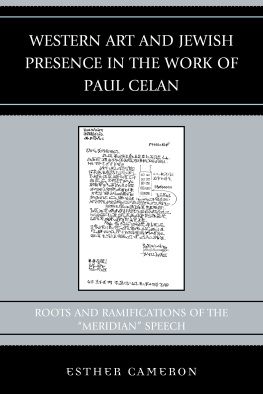
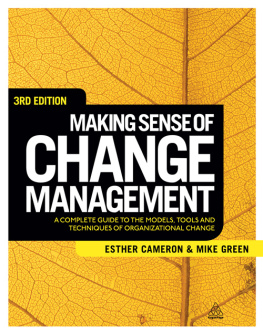

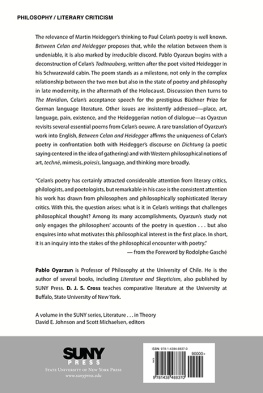
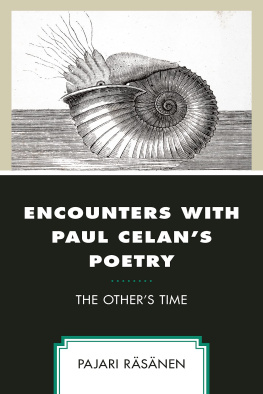
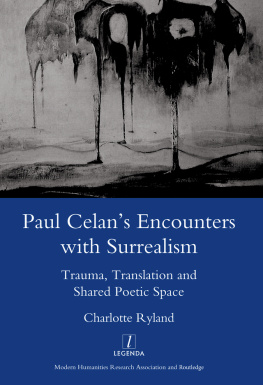
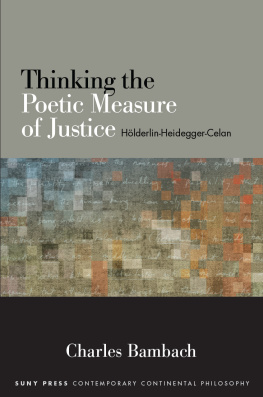
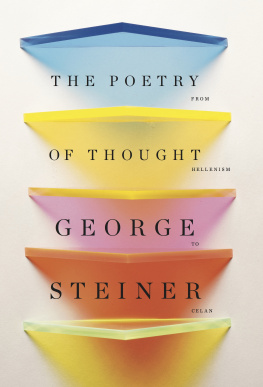
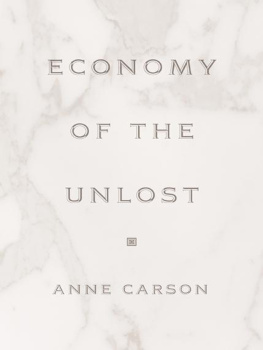
 TM The paper used in this publication meets the minimum requirements of American National Standard for Information Sciences Permanence of Paper for Printed Library Materials, ANSI/NISO Z39.48-1992.
TM The paper used in this publication meets the minimum requirements of American National Standard for Information Sciences Permanence of Paper for Printed Library Materials, ANSI/NISO Z39.48-1992.